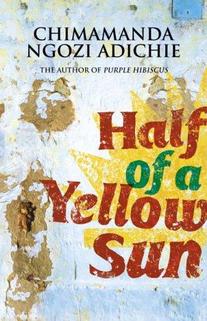|
Half of a Yellow Sun is gripping and award-winning book by Chimamanda Ngozi Adichie. It is about the civil war in Nigeria and the struggle to create a new country, Biafra, back in the sixties. It is told through the eyes of Ugwu, a loveable, young houseboy, who comes to work in the house of a revolutionary African professor, Odenigbo. Ugwu is from the village, and everything is strange and fasinating to him. His master is a kind man, who treats him as an equal. Later, the love of Odenigbo's life, Olanna, daughter of a rich Government servant, moves in with them. The book explores human relationships deeply, the relationships and dynamics between man and woman, servant and master, woman and child, man and mistress, people and their government, people and the rich, people and their oppressors, rulers and the ruled, blacks and whites. Local identity overrules the national identity, and also overules common sense and humanity, especially at times of war. War is the great leveller, making refugees out of an entire nation.
Ugwu, Odenigbo and Olanna struggle with the life that has been thrust upon them. Things get worse before they get better, and they undergo trying circumstances, with remarkable strength. This is especially true for Olanna, who grew up in luxury, never wanting anything, but adjusts to life without the basic necessities. They forgive each other, even when grievously wronged, and their very unique bond is the only thing that gets them through extremely hard times. As you read, you feel their pain, and find yourself praying that they get through this alive. The author makes the reader experience the war raging outside, by narrating the war within each of them, and between them. In pain, people do strange things and hurt one another, and these are no exception. They come very close to losing all hope and sanity, but they are pulled back when they are at the brink, by a return to normalcy. Though a novel, it is based on real events, and very real emotions. A great author understands that you can't make people experience an actual event, you can only make them experience the emotions that make the event so real. Chimamanda Ngozi Adichie is one such author. Through their dialogues, the book raises larger questions which plague countries that underwent colonial rule. The Nigerian struggle to be their own people, to stop bowing to all Western thought, the enforcing of a national identity, the love of one's country are all issues that any thinking Indian grapples with on a daily basis, even unconsciously. Worse than the economic and political oppression that a colonial power creates, is the loss of identity, the loss of the sense of self, and the hatred of one's fellow citizens, that are the real left-overs of colonial rule. These take generations to remedy. Odenigbo's hope and burning idealism to see a truly independent Nigeria, free of the colonial shadow, almost kills him internally, while the war kills everything externally.
0 Comments
Leave a Reply. |
Archives
June 2018
Categories
All
LinksThe New Yorker Old Blogs |

 RSS Feed
RSS Feed
